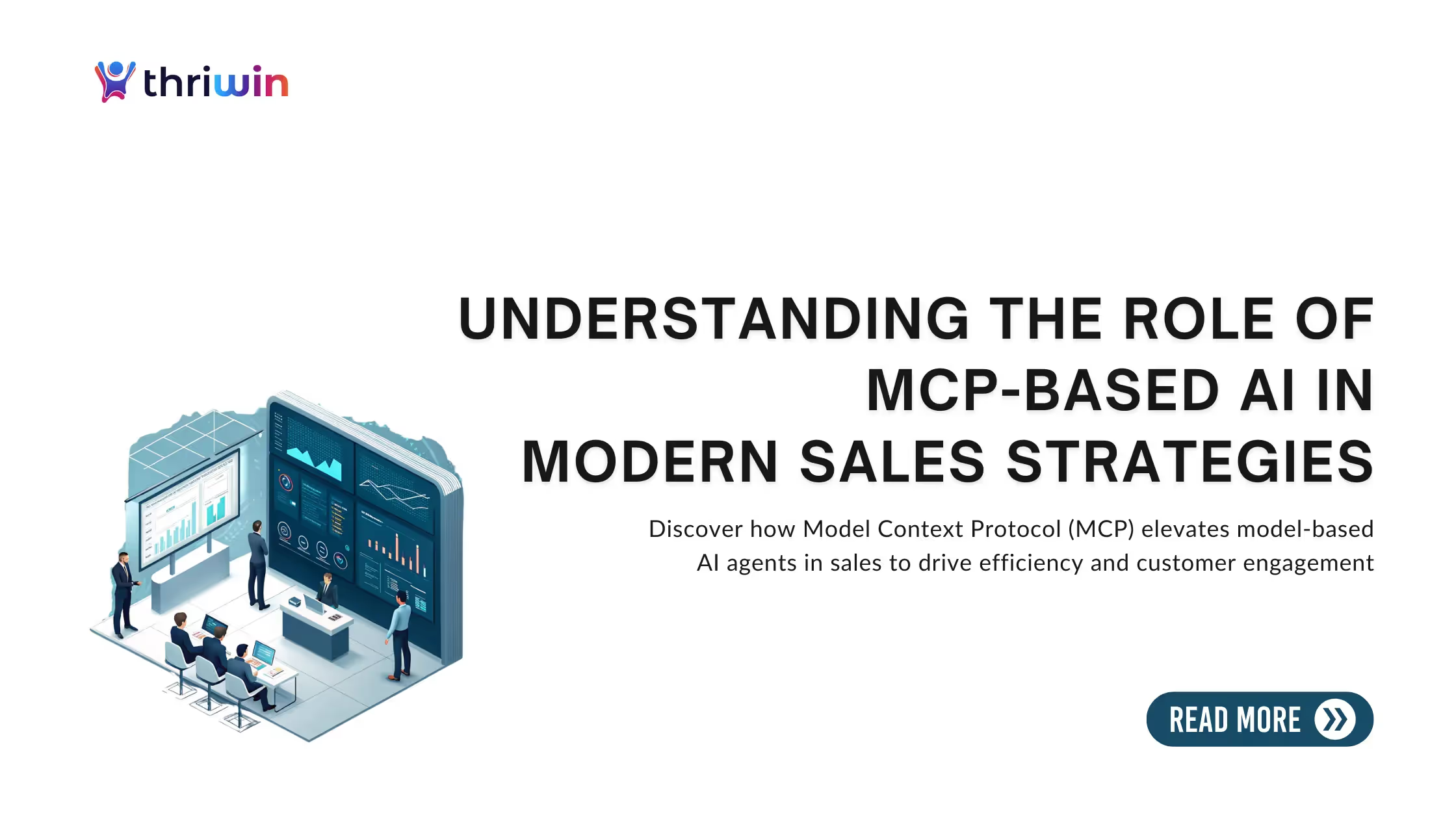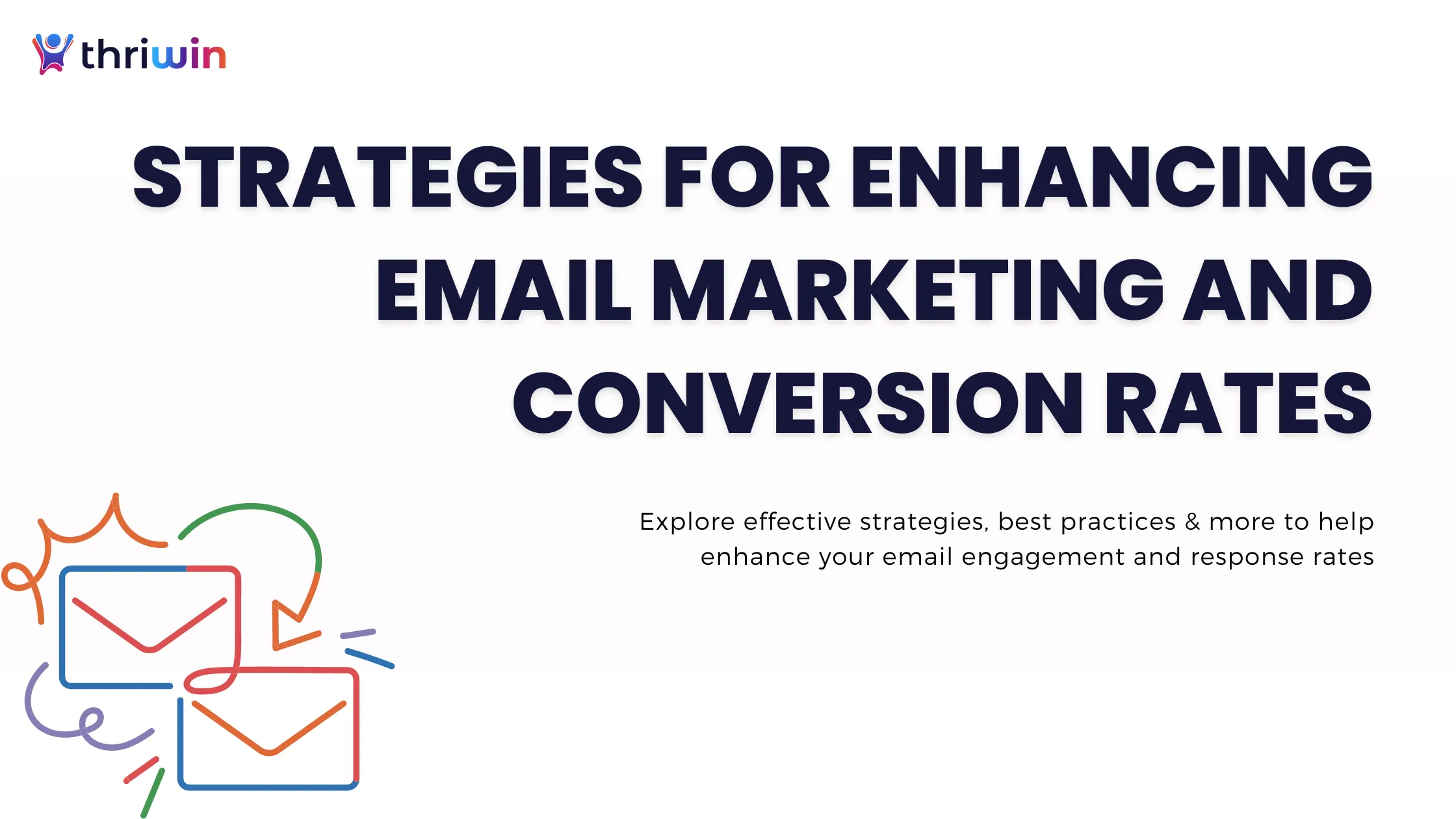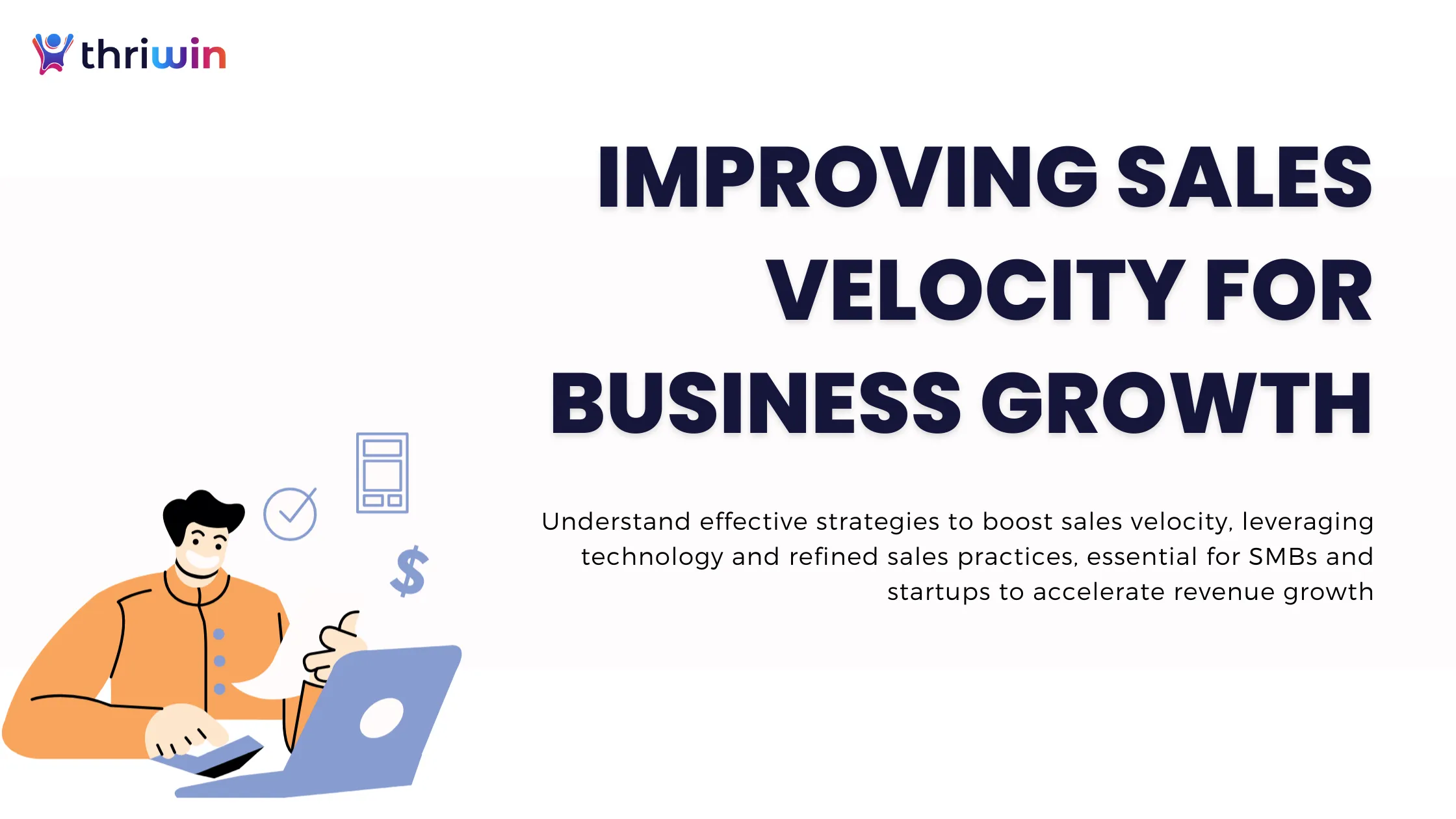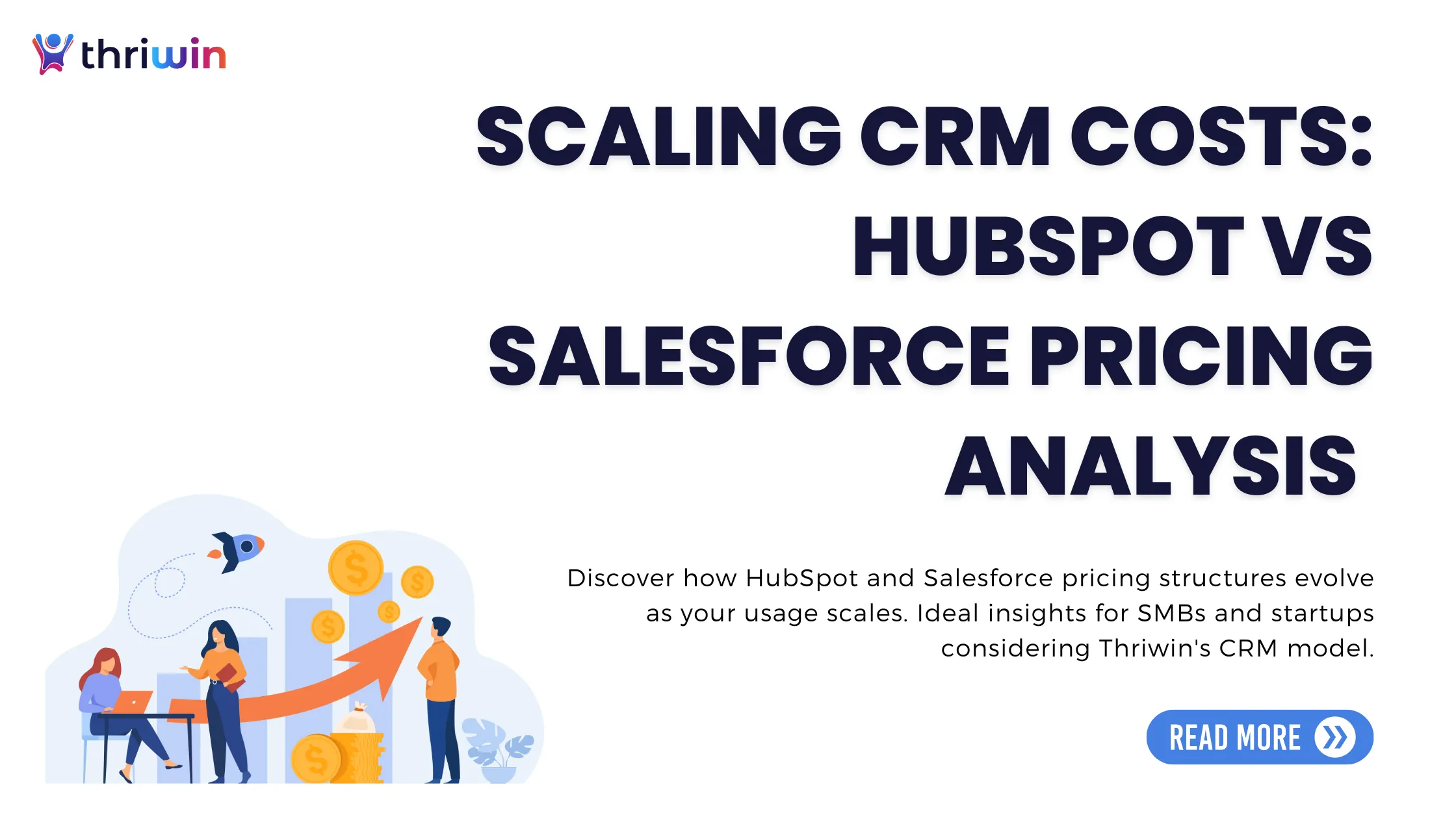Sales teams increasingly rely on artificial intelligence to improve efficiency and strengthen customer engagement. This article examines how Sales AI agents that use Model Context Protocol (MCP) help organizations achieve better outcomes. This piece focuses on practical approaches that address everyday sales challenges and explains why Thriwin stands out for businesses seeking to integrate Sales AI into their operations.
Evolution of AI Agents in Sales
Sales organizations once depended on basic rule-based systems that responded to predefined triggers. Those systems have given way to agents powered by AI models built on historical data and past interactions. More advanced Sales AI agents now participate in sales processes with increased precision, offering responses that reflect prior customer contacts and real-time signals. Research shows that more companies are implementing intelligent Sales AI agents to manage lead follow-up and customer support. The move toward these advanced agents stems from the need for context-aware interactions during customer conversations.
Transition from Rule-Based to Model-Based Agents
Older systems operated on if/then logic was suitable for simple scenarios. Modern Sales AI agents use model-based approaches that rely on customer history, behavior patterns, and real-time data. With this system, agents produce decisions that align with business interactions and recommend actions based on past events. This progression helps sales teams improve performance by reducing manual tasks and promoting more effective customer communication.
Understanding Model Context Protocol (MCP)
Model Context Protocol (MCP) defines how a Sales AI agent operates by dividing its functionality into three parts:

- Model: A repository that stores sales knowledge, including common buyer behaviors, industry terms, and detailed product information.
- Context: A memory that holds previous conversations, customer records, and current input from various sales channels.
- Protocol: The guidelines governing the agent's actions ensure that every response meets company policies and industry standards.
This framework enables Sales AI agents to offer responses that reflect a complete picture of each customer interaction. By combining the three components, MCP-based agents work efficiently and provide appropriate answers.
Limitations of Large Language Models (LLMs) in Complex Sales
LLMs produce general responses based on extensive text data. In detailed sales activities, however, these models have certain shortcomings:
- They often deliver generic answers that do not incorporate specific customer histories.
- They lack integration with sales platforms that merge customer data from different sources.
- They may ignore company policies and rules that guide complex sales interactions.
- They can miss details vital for handling negotiation steps in real sales scenarios.
MCP-based Sales AI agents address these issues by providing additional structure and using context-based rules to generate more relevant and accurate responses.
Addressing Key Sales Challenges with MCP-Based AI Agents
Sales teams face tasks that slow down the selling process. Repeating routine work, handling fragmented customer data, and inconsistent follow-up can reduce efficiency. MCP-based Sales AI agents offer a unified system that automates these tasks and keeps customer interactions consistent.
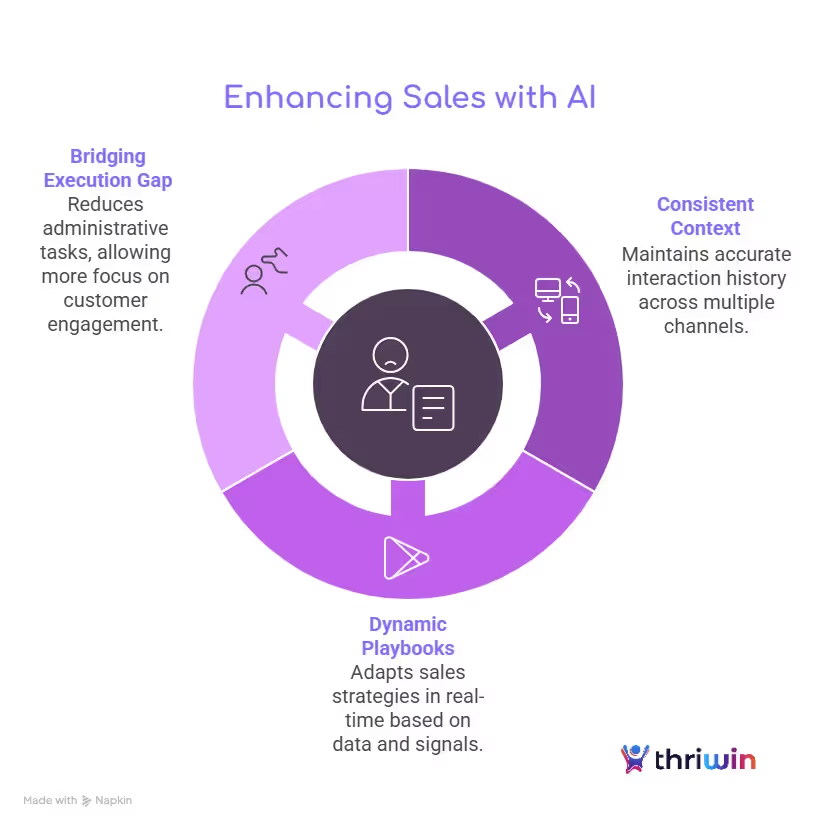
Bridging the Sales Execution Gap
When administrative duties are reduced with the help of Sales AI agents, sales representatives can focus more on engaging with potential customers. MCP-based agents process customer details quickly and span multiple touchpoints. This consolidation reduces non-selling tasks and allows sales teams to allocate more time to closing deals. Data from recent studies indicate that companies using these advanced agents see improved conversion rates as representatives spend more time on revenue-related activities.
Achieving Consistent Context Across Sales Platforms
Sales interactions often occur over customer relationship management (CRM) software, email, and chat services. Maintaining customer details accurately across these channels is a challenge for many organizations. MCP provides a method to retain interaction history, ensuring that every touchpoint reflects earlier communications. This leads to more personalized conversations and helps build greater trust between customers and sales teams.
Enabling Dynamic Sales Playbooks via MCP
Traditional sales playbooks follow fixed scripts and responses. With MCP, Sales AI agents can adjust playbooks dynamically in real-time. Rather than relying on pre-set responses, the agents update their approach based on the latest data and customer signals. This results in sales processes that are more adaptable, aligning with current customer interests and market conditions.
Enterprise-Readiness of MCP-Powered Sales AI Agents
Organizations that need reliable and scalable Sales AI solutions require agents that integrate seamlessly with current tools, maintain high-security standards, and comply with established protocols. MCP-based Sales AI agents meet these needs and prove their worth in enterprise settings.
Standardized Protocols for Enhanced Control
Standardization in the operations of Sales AI agents plays a vital role in ensuring quality and compliance. With MCP in place, agents function according to predefined guidelines that adhere to regulatory standards and company policies. Clear operational rules provide a base for accountability and enable management to monitor agent performance efficiently.
AI Agents as Integrative Middleware
Sales processes involve many different tools and data sources. MCP-based agents work as a linking layer that combines data from CRMs, communication platforms, and other applications. This integration leads to smoother workflows, as sales teams can access consolidated customer information for all interactions. Combining data from various sources helps teams work more efficiently and be informed by a complete customer picture.
Ensuring Responsible Autonomy in Sales AI
Even though advanced Sales AI agents operate with a high degree of independence, oversight remains a priority. The protocols within MCP allow for controlled actions and include backup options for human involvement. This structure gives sales leaders confidence that while agents perform routinely, they still operate within the guardrails set by the organization.
Transformative Use Cases of MCP-Based Sales AI Agents
Real-world examples demonstrate the benefits organizations experience by using MCP-based Sales AI agents. These practical applications highlight improvements at various points in the sales process.
Automating Lead Qualification
MCP-based Sales AI agents can assess incoming leads by analyzing prior customer interactions, website activity, and demographic information. By automatically screening leads, agents reduce the workload on sales representatives. Companies have seen a decrease in the time spent on lead qualification, allowing sales teams to follow up with high-potential leads more rapidly. Thriwin’s solution exemplifies how such agents improve efficiency in qualifying leads.
Enhancing Sales Forecasting Accuracy
Accurate sales forecasting relies on multiple data inputs. MCP-based agents aggregate data from CRM systems, email campaigns, and call records to create reliable revenue predictions. These agents provide forecasting that reflects the current sales environment by processing historical and real-time data. With such clarity, sales managers can adjust strategies and better allocate resources.
Post-Sale Customer Engagement and Upselling
Customer interactions continue after the deal is closed. MCP-based Sales AI agents monitor post-sale data, including product usage and follow-up communications. This monitoring helps the agent suggest additional products or services at opportune times. Customer retention improves when follow-up communications are relevant and based on prior interactions. As a result, organizations see increased long-term value from each customer.
Synergy Between Conversational Agents and Human Sales Teams
Many sales processes benefit from combining AI's speed with human teams' insight. MCP-based conversational agents manage standard questions and routine follow-ups, while human representatives address more complex customer needs. This balanced system ensures customers receive quick responses and thoughtful interactions when needed. Data from companies using this approach point to higher customer satisfaction and an overall boost in sales performance.
Dissecting MCP: A Technical Overview for Sales Leaders
A closer examination of MCP reveals how its three key elements work together to support Sales AI agents effectively.
The Model Layer: Embedding Sales Expertise
The Model layer stores detailed sales information—including buyer behavior, common objections, and product specifics. With this repository in place, Sales AI agents deliver responses that reflect actual business situations. Information from past interactions, training data, and industry knowledge contributes to making the agent's responses meaningful for each customer scenario.
The Context Layer: Preserving Customer Interaction History
The Context layer retains details from previous communications. With access to a complete history of customer interactions, Sales AI agents can connect current queries to earlier events. This ongoing memory enables agents to maintain coherent conversations, acknowledging past customer feedback and preferences. In doing so, agents foster interactions informed by accurate, historical data.
The Protocol Layer: Establishing Operational Boundaries
The Protocol layer specifies rules and guidelines that govern the agent's actions. Clear boundaries ensure that responses are safe and consistent with company policies. With these rules in place, sales managers can supervise agent behavior effectively. The Protocol layer builds a secure foundation by setting guidelines for permissible actions and fallback procedures.
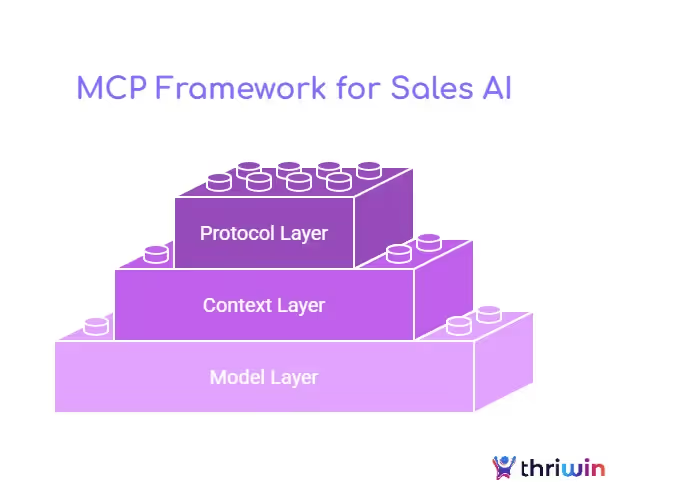
Implementation and Best Practices for Adopting MCP-Based Sales AI Agents
Organizations that choose MCP-based Sales AI agents benefit from various best practices that support integration and ongoing operation.
Step 1. Evaluate Readiness for MCP Integration
- Review Data Quality
Confirm that your data sources (CRM, email records, customer history) are current and accurate. - Check Compatibility
Assess whether existing systems (sales platforms, communication tools) can communicate with an MCP-based solution. - Identify Internal Expertise
Determine if your team has the necessary skills (data analysis, IT support) to support an AI solution. - Perform a Gap Analysis
Compare your current infrastructure with the requirements for MCP integration and note any adjustments needed.
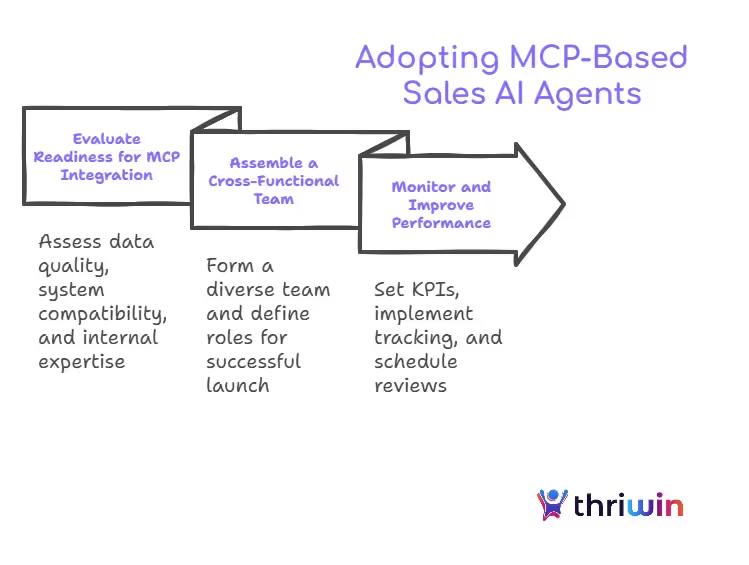
Step 2. Assemble a Cross-Functional Team for a Successful Launch
- Form a Diverse Group
Include representatives from sales, technology, data management, and customer service. - Define Roles and Responsibilities
Clearly outline tasks such as system testing, process refinement, and ongoing maintenance. - Establish Communication Channels
Set up timely review meetings and reporting systems so team members can quickly share updates and address challenges. - Plan Training Sessions
Organize internal training for the team to become proficient in using and managing the Sales AI agents.
Step 3. Monitor and Improve Sales AI Performance Continuously
- Define Key Performance Indicators (KPIs)
Set measurable targets like lead conversion rates, response times, and customer satisfaction scores. - Implement a Tracking System
Use dashboards or reporting tools that provide real-time data on agent performance. - Schedule Regular Review Meetings
Periodically review performance data with the cross-functional team to identify trends and areas of improvement. - Adjust Protocols and Retrain Agents
Make changes to guidelines if needed and update agent training periodically based on feedback and performance metrics.
Future Trends in Sales AI: The Ongoing Evolution of MCP
Sales AI agents that use MCP are expected to become increasingly important as technology progresses. Emerging trends indicate that Sales AI will become more interactive and secure.
Innovations in Natural Language Processing and AI Interaction
Advances in language models continue to improve how Sales AI agents manage complex customer questions. Ongoing improvements in processing language data are expected to refine agent responses further, making interactions transparent and reflective of customer queries.
Integration with Other Emerging Technologies
Future sales systems may incorporate additional tools like sensor data from connected devices or secure data protocols from distributed ledger systems. These emerging integrations can further improve the performance of Sales AI agents by providing a broader view of customer interactions.
Maintaining Ethical Standards in Autonomous Sales AI Operations
As adoption increases, maintaining clear ethical guidelines remains a priority. Sales AI agents that use MCP will continue to follow well-defined policies that protect customer information and support accountability. Industry discussions will help shape further measures to ensure these systems remain responsible over time.
Embracing MCP-Based Sales AI for Competitive Advantage
Adopting MCP-based Sales AI agents helps sales teams improve customer communication, lead management, and sales forecasting by combining data from all available touchpoints. With routine tasks handled automatically, sales professionals can devote more time to critical interactions, resulting in higher conversion rates, improved customer retention, and steady revenue growth. Every engagement benefits from the complete view provided by historical data, ensuring that the transition from prospect to qualified lead is smooth and efficient.
By blending automated support with human expertise, organizations gain a system that supports every stage of the sales process—from initial lead qualification to post-sale follow-up. This balanced approach leads to better resource allocation, satisfying customer interactions, and substantial competitive outcomes. Contact Thriwin now for a demonstration of how MCP-based Sales AI agents can reshape your sales operations and help you achieve your goals.
Call to Action: Transform Your Sales Strategy with Thriwin’s MCP-Powered AI Agents
If your team could benefit from a solution that seamlessly blends aggregated data with the expertise of experienced professionals, consider exploring Thriwin’s Sales AI platform. Our MCP-based agents support day-to-day operations by ensuring that every customer interaction reflects a complete view of past engagements, enabling your team to concentrate on meaningful conversations.
Visit www.thriwin.io and book a demo to see how our solution can integrate into your existing processes. Discover how Thriwin’s approach supports every stage of your sales process, delivering clarity and improving outcomes without disrupting your current workflow.
Frequently Asked Questions:
1. What is the Model Context Protocol (MCP)?
The Model Context Protocol (MCP) is an open standard that enables AI models to interact seamlessly with external tools, data sources, and services. It acts as a bridge, facilitating standardized communication between AI systems and external services, and enhancing tool integration and AI reasoning capabilities.
2. How does MCP enhance the functionality of Sales AI agents?
MCP structures the functionality of Sales AI agents into three key components:
- Model: A repository that stores sales knowledge, including common buyer behaviors, industry terms, and detailed product information.
- Context: A memory that holds previous conversations, customer records, and current input from various sales channels.
- Protocol: The guidelines governing the agent's actions ensure that every response meets company policies and industry standards. This framework enables Sales AI agents to offer responses that reflect a complete picture of each customer interaction.
3. What are the benefits of integrating MCP-based Sales AI agents into a sales strategy?
Integrating MCP-based Sales AI agents can improve customer interactions, more accurate lead qualification, enhanced sales forecasting, and streamlined workflows. By automating routine tasks, sales professionals can focus on engaging with prospects and addressing customer needs effectively.
4. What are the best practices for implementing MCP-based Sales AI agents?
Best practices include evaluating readiness for MCP integration by reviewing data quality and system compatibility, assembling a cross-functional team for a successful launch, and continuously monitoring and improving the Sales AI agent's performance.
5. How does MCP contribute to the future of AI integration in sales?
MCP represents a significant step towards developing more intelligent, collaborative, and adaptable AI agents. By providing a standardized framework for context sharing, MCP enables AI agents to seamlessly collaborate and exchange information, enhancing the accuracy and reliability of AI systems in sales operations.
%201.svg)


